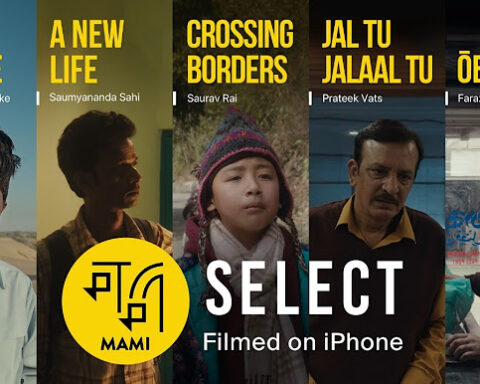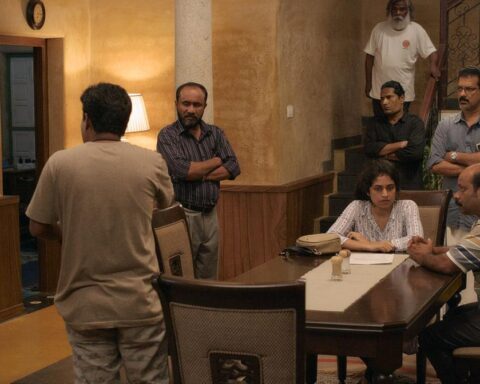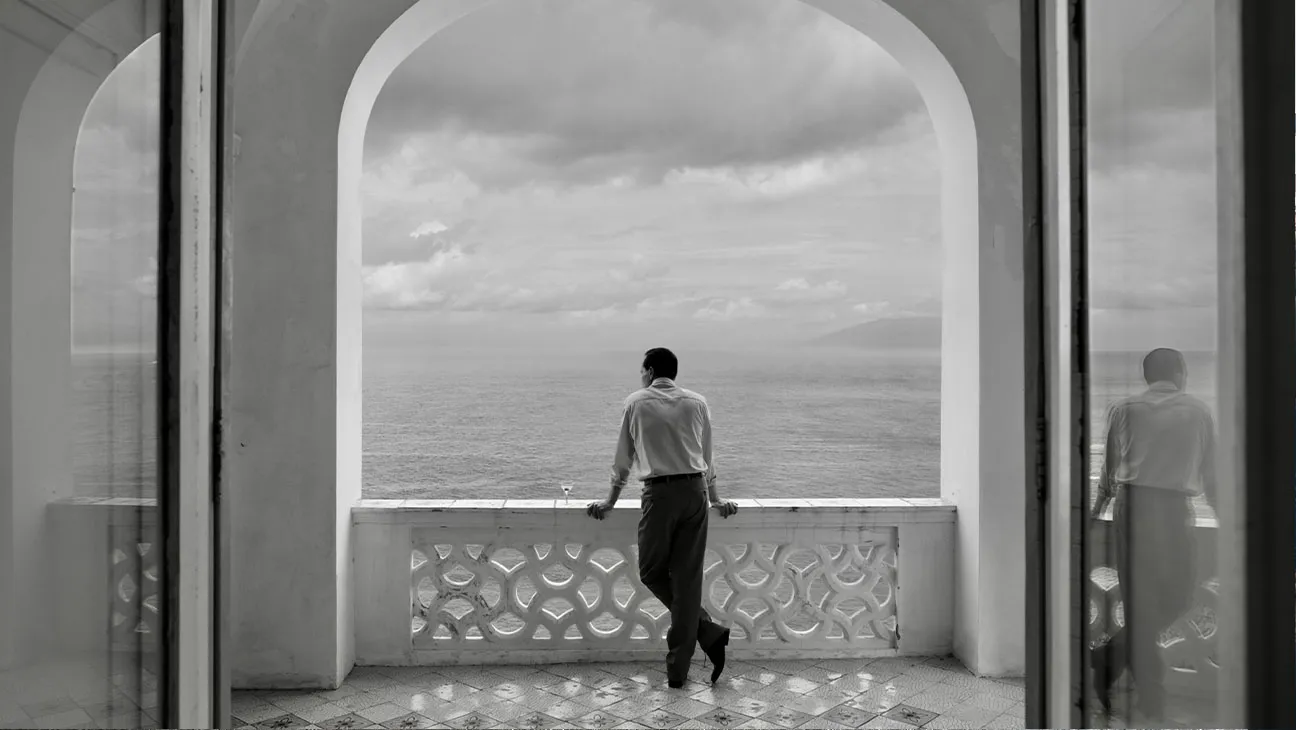Defining an independent film goes beyond financial considerations to encompass creative freedom, narrative innovation, distribution methods, and a commitment to artistic intent. Independent filmmaking thrives on the passion and vision of filmmakers determined to tell unique stories that challenge and captivate audiences. The following ten examples demonstrate how the cinematic landscape of India continues to evolve; the definition of independent film will likely remain fluid, reflecting the dynamic nature of a medium that constantly pushes boundaries and defies easy categorization. While preparing this list, I considered films that had their world premiere at various film festivals around the world this year.
FAMILY (Malayalam)
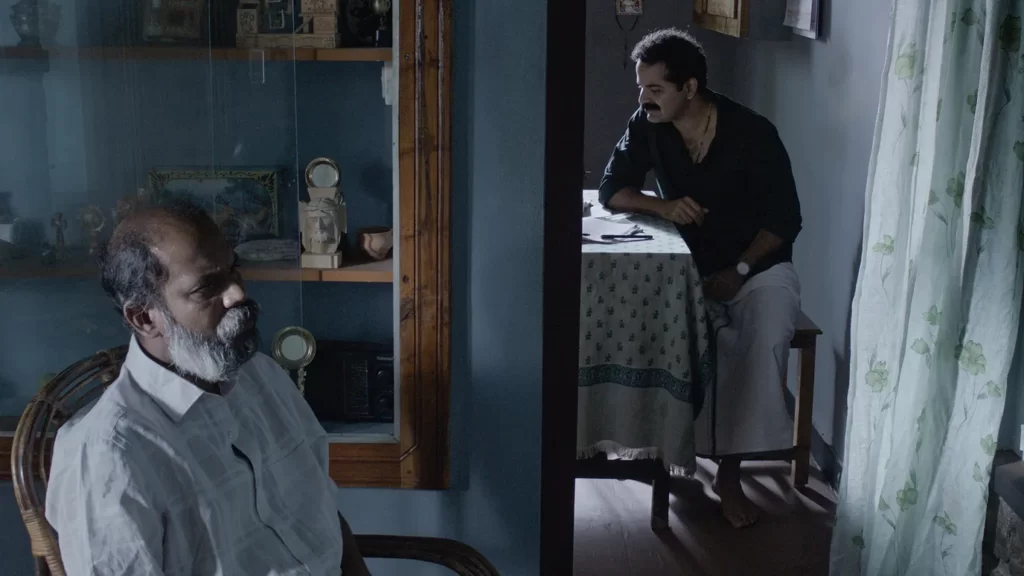
Directed by Don Palathara and co-written by Sherin Catherine Family serves as a poignant condemnation of the deceit and misconduct lurking beneath the seemingly tranquil camaraderie of a Christian community in Kerala. Palathara meticulously dissects the intricate and intrusive social dynamics within the rural population, revealing how their secretive self-preservation tactics are intricately linked with a profound sense of vulnerability and inadequacy.
At the heart of the narrative is Sony (Vinay Forrt), a virtuous man who earnestly practices his religion and adheres to the church’s rules, which, in turn, define the community’s moral compass. Sony’s role within the village fabric is pivotal, but appearances are deceiving, as his benevolent exterior conceals a darker truth. Collaborating with co-screenwriter, Palathara constructs a film that unfolds at a deliberate pace, immersing itself in the daily routines of village life and the emotional undercurrents simmering beneath the surface, occasionally erupting into the open.
Maintaining a detached objectivity, Palathara allows the narrative details to unfold organically, affording viewers glimpses into the intricate and volatile inner lives of the characters. It portrays a world seemingly designed to erode solidarity and vilify decency and adopts a stern, unsentimental tone, conveying the palpable trauma embedded in an unyielding cycle of abuse. The film stands as a stark and unflinching exploration of a community grappling with its demons, exposing the harsh realities beneath the veneer of societal norms.
Family premiered in the Harbour section of the International Film Festival of Rotterdam.
KAYO KAYO COLOUR? (Which Colour, Hindi and Gujarati)
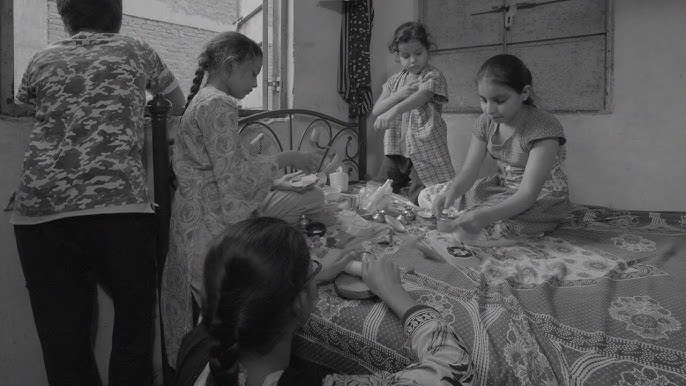
With his debut feature film, Kayo Kayo Color? Shahrukh Khan Chavada adopts a distinctive approach, an unusual blend between fiction and docu-drama, offering a genuine portrayal of a marginalized community that mainstream Indian cinema evades. explores the everyday routines and genuine concerns of this community, providing an authentic glimpse into their lives.
Set in a Muslim ghetto in Kalupur, Ahmedabad, the film follows the lives of Raziya (Samina Shaikh), a working-class woman who rises early to care for her children, Faiz (Fahim Shaikh), and Ruba (Yushra Shaikh). Meanwhile, her unemployed husband, Razzak (Imtiyaz Shaikh), endeavors to gather funds to purchase an autorickshaw in the hope of securing a livelihood. Kayo Kayo Color? revolves around the mundane activities of its characters, interspersed with unremarkable moments that seamlessly blend content and form, providing a faithful portrayal of the socioeconomic life of the Muslim people in the neighborhood.
Chavada’s film delves into the essential core of human values and relationships. The uncertainties of life intertwine with the characters’ struggle for survival, marking a daring and enduring presence in a world that seeks to erase every trace of their existence. The film stands as a testament to Chavada’s commitment to realistic depictions of the lives of the Muslim community, challenging the artificial and stereotypical representations often found in Indian cinema.
Kayo Kayo Color? premiered in the Focus: The Shape of Things to Come? section of the International Film Festival of Rotterdam.
FOLLOWER (Marathi, Kannada, Hindi)
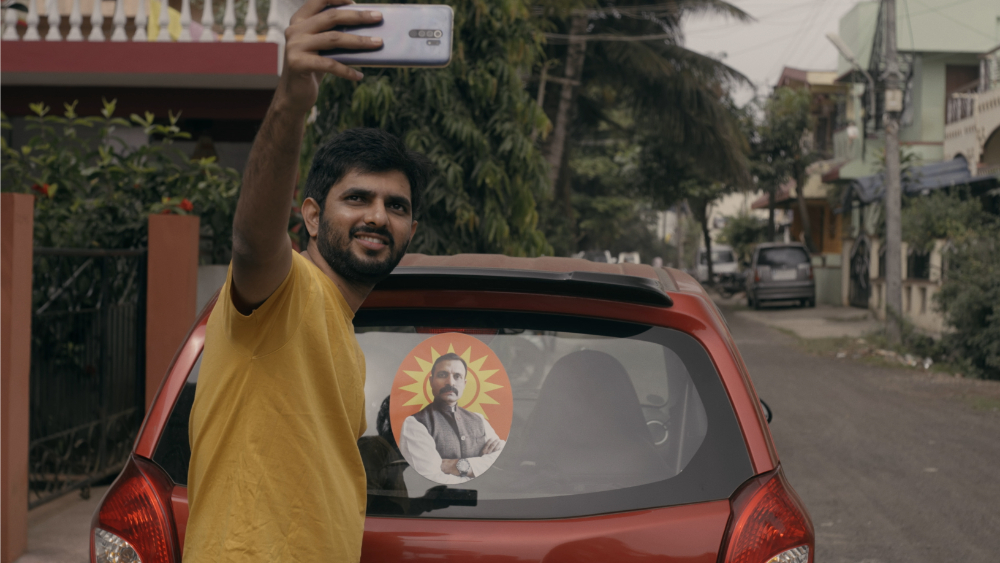
Harshad Nalawade‘s film Follower is set within the linguistically disputed town of Belgaum, Karnataka. The protagonist, Raghavendra Pawar (Raghu Prakash), works at the online news source Sanyukata Vaani, where he identifies as a journalist. In reality, he and two colleagues post incendiary tweets dictated by a senior official, criticizing rivals. Despite realizing the propaganda nature of the information, Raghu believes he serves a greater cause. A conflict between him and his YouTuber friend Sachin (Harshad Nalawade) arises over their political stand, and personal causes give rise to a drastic conclusion to their friendship.
The narrative critically examines how the division between conservatism and contrarianism disrupts the cohesive fabric of solidarity among individuals. The movie effectively portrays the current sociopolitical climate in India, offering an unfiltered portrayal of how political discourse is shaped through the manipulation of information on social media. Nalawade’s depiction of this reality is not controversial; instead, the film comes across as genuine and nuanced. By specifically delving into the psyche of a linguistically marginalized individual who becomes a vulnerable target for those promoting hate, Nalawade accurately captures the essence of the 21st-century political climate in India.
Follower premiered in the Focus: The Shape of Things to Come? section of the International Film Festival of Rotterdam.
AGRA (Hindi)

The story revolves around Guru and his family in Agra, where they reside in a worn two-story house that symbolizes the underlying discord within its walls. Guru, seeking refuge, yearns for the terrace as a personal sanctuary with his imaginary girlfriend, providing an imaginative escape from the oppressive realities surrounding the house. Within the residence, a labyrinth of emotions resides—not only fractured family bonds but also complex threads of conflicting desires. However, as a victim of fractured masculinity, Guru unintentionally becomes the catalyst, perpetuating a cycle of aggressive actions that jeopardize any semblance of moral clarity. Within this psychological battleground, the excuses he relies on for survival morph into chains, ensnaring him in a distorted reality.
With his second feature film, Kanu Behl solidifies his position as one of India’s most uncompromising filmmakers. He fearlessly confronts the discomfort associated with navigating the complexities of human nature. Teaming up with co-writer Atika Chouhan, he courageously exposes audiences to uncomfortable truths, successfully pushing boundaries and challenging societal norms. Amidst this landscape of contradictions, feelings of repulsion and pity merge, shaping the protagonist into a complex mosaic of emotions that elicits not just judgment but also a compelling sense of introspection.
Agra premiered in Directors’ Fortnight at the 76th Cannes Film Festival.
GURAS (Nepali)

Saurav Rai shapes Guras around the subtle nuances of nature, meticulously capturing the intricacies of daily life with a remarkable blend of clarity, soulfulness, and sensitivity. The film’s treatment embraces simplicity, enabling the director to establish sincerity and foster a genuine human connection. Through a compassionate exploration of the characters’ choices and decisions, Rai provides a pathway for the audience to appreciate the significance of minimalism in conveying life’s complexities. This relatable approach fosters empathy and understanding, prompting reflection on the beauty and importance inherent in everyday occurrences. Notably, the film is disarming in its absence of cynicism, reflecting the work of an experienced filmmaker who has given profound consideration to these themes.
The film unfolds on a tranquil tea plantation nestled amidst hills, portraying the rhythm of life dictated by routine. Narrated through the eyes of a nine-year-old protagonist, the story delves into the intricacies and challenges of existence in this serene yet demanding environment. A pivotal moment occurs when her beloved pet dog, Tinkle, mysteriously disappears one fateful night. The potential threat of a nocturnal leopard becomes a looming factor in Tinkle’s disappearance. Simultaneously, speculation arises that someone from the nearby community might be behind the abduction.
Guras premiered in the competitive section of the 58th Karlov Vary International Film Festival.
RIMDOGITTANGA (Rapture, Garo)
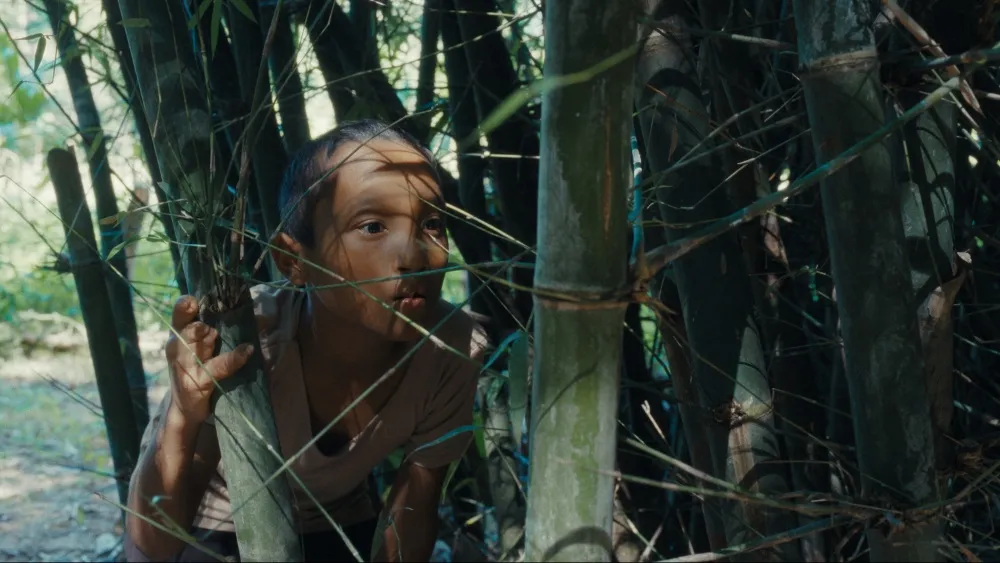
Dominic Sangma‘s Rimdogittanga is a poignant exploration of the human psyche, prompting reflection on the intricate dance of contrasts that defines our journey through life. Through its poetic lens, the film not only challenges the binary constructs of good and evil but also invites viewers to embrace the beauty that emerges from the delicate balance between opposing forces. The boundaries blur, and the audience is left with a profound contemplation of the intricate shades that color the human experience. Through a child’s perspective, Sangma intricately explores the village’s dynamics, offering a universal commentary on power, fear, and the pervasive dark undercurrents within communities.
At its essence, the narrative revolves around communities committing egregious acts under the deceptive guise of maintaining peace, emphasizing the solidarity of those who, driven by numerical superiority, justify their actions. The film serves as a potent commentary on societal structures, revealing the unsettling consequences of unchecked power imbalances. It unfolds as a powerful commentary on societal structures and the unsettling consequences that arise when power imbalances go unchecked. In this way, Sangma masterfully intertwines the local and the universal, crafting a narrative that is both culturally specific and universally resonant.
Rimdogittanga premiered in the competitive section of the 77th Locarno Film Festival
BAHADUR THE BRAVE (Nepali, Hindi)

In her debut film, Diwa Shah intricately constructs the narrative, skillfully navigating the delicate balance between the mundanity of the situation and the profoundness of the action. The film unfolds with an overtly realistic tone, capturing the essence of everyday life while infusing it with layers of depth and significance. demonstrates a keen ability to portray the ordinary with authenticity, elevating seemingly routine occurrences to moments of poignant significance. This delicate equilibrium in tone not only adds a layer of nuance to the storytelling but also reflects Shah’s artistic prowess in capturing the intricacies of the human experience within the framework of a compelling narrative.
At the center of the narrative is Hansi, a diligent Nepali migrant laborer toiling on the Indian landscape. While initially depicted as a gentle and subservient worker, the film delves deeper into his character, unraveling layers of complexity. Under the facade of hard work and obedience lies a different facet of Hansi. This seemingly innocuous trait eventually evolves into a crisis of conscience, casting a shadow over his character and the choices he makes. By exposing the multifaceted nature of its protagonist, the narrative challenges conventional stereotypes and invites viewers to confront the intricate dynamics that affect individual fate.
Bahadur the Brave premiered in the New Directors Competitive Section at the 71st San Sebastián Film Festival.
STOLEN (Hindi, Santhali)
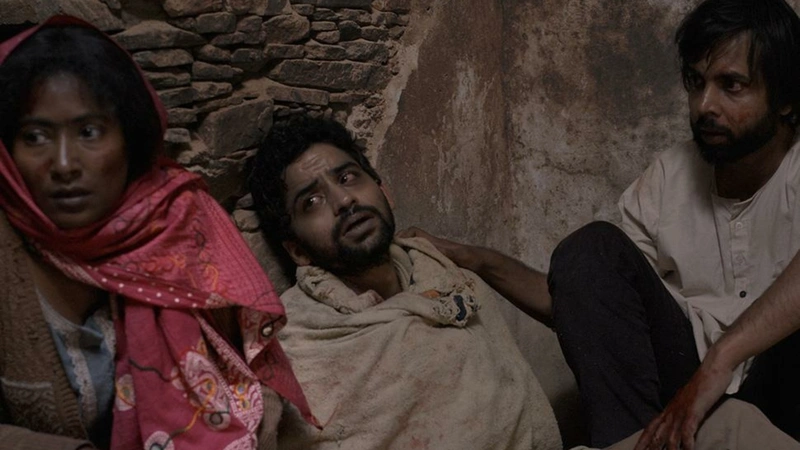
Stolen is a gripping exploration of the human condition, offering a nuanced portrayal of the characters as they navigate a perilous landscape shaped by societal perceptions, false narratives, and the innate resilience of the human spirit. Through its tense and emotionally charged narrative, the film serves as a poignant commentary on the lengths to which individuals can be driven by empathy, even when faced with the most formidable odds in rural India’s unforgiving terrain. The film delves into the profound repercussions of misinformation, societal prejudices, and the harsh realities faced by those who embark on a journey fueled by compassion. Gautam and Raman, initially affluent individuals, find themselves inadvertently thrust into a terrifying odyssey as they navigate the challenges of rural India in their quest to aid Jhumpa, a destitute and grieving mother desperate to reunite with her stolen child.
Debutant Karan Tejpal skillfully highlights how rumors, when propagated through digital platforms, can have detrimental consequences, shaping public opinion and triggering a chain reaction of events that spiral out of control. The film serves as a stark reminder of the deep-seated inequalities and hardships faced by marginalized communities, amplifying the harsh realities of their existence. It is a cautionary tale about the potential dangers of instant connectivity and the responsibility that comes with disseminating information in a globalized and interconnected world.
Stolen premiered in the Orrizonti Extra section of the Venice Film Festival.
STHAL (A Match, Marathi)

Sthal unravels the intricate web woven by gender bias, patriarchy, social inequality, and economic backwardness, showcasing how these elements are interlinked. It employs a realistic treatment, skillfully capturing finer details without adopting a didactic approach. This allows the audience to immerse themselves in the narrative, encouraging reflection and enabling them to draw their own conclusions. The protagonist, Savita, epitomizes the struggle against societal norms. A final-year BA student residing in a village in the Vidarbha region of Maharashtra with her parents and elder brother, Savita aspires to complete her education and secure a government job. However, her ambitions clash with the traditional expectations imposed upon her by her parents, who are more focused on arranging her marriage than supporting her pursuit of career goals or the right to live life on her terms.
Amid the somber narrative, Jayant Somalkar skillfully injects a measured dose of humor into the storytelling, adding a nuanced layer that lightens the overall tone. The film paints a vivid picture of the societal pressures and familial expectations that hinder Savita’s journey towards independence and self-realization. The village becomes a microcosm, reflecting the broader struggles of individuals grappling with the interplay of tradition, education, and personal aspirations.
Sthal premiered in the Discovery Program at the 48th edition of the Toronto International Film Festival.
THADAVU (The Sentence, Malayalam)

Geetha, the central character in Thadavu, grapples with a myriad of challenges that have woven a complex tapestry of difficulties into her life. Primarily, she is embroiled in a legal battle for the custody of her daughter, a struggle that adds layers of emotional turmoil to her already complicated existence. Moreover, Geetha finds herself entangled in a moral dilemma as she takes the blame for a co-worker at a playschool, an act that further complicates her personal and professional life. To compound matters, her health is on a downward spiral, introducing an additional layer of adversity into her already tumultuous journey.
Fazil Razak, in his first outing as a director, weaves an intricate web of tribulations, where each challenge faced by Geetha becomes a sentence, a clause in the story of her life, contributing to the overall theme of struggle and resilience. Despite the mounting difficulties and the relentless barrage of challenges, Razak lets his protagonist stand resilient, embodying a spirit that refuses to succumb to the adversities that life has thrust upon her. This is a film that is a celebration of the human ability to confront adversity head-on, finding strength in the face of life’s most formidable challenges.
Thadavu premiered in the South Asian competition section of the Jio MAMI Film Festival.



